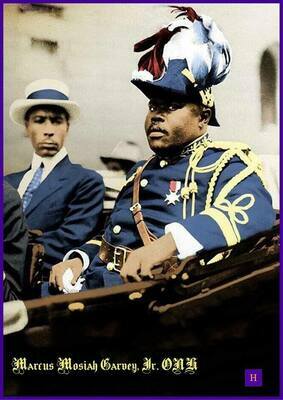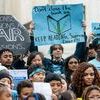Marcus Garvey and His Impressive Work

I need to start this narrative by mentioning that I live in Atlanta, Georgia in the United States. Regarding Atlanta, in 1922, J. Edgar Hoover and others in the government were so alarmed at the remarkable and effective organizing work by Marcus Garvey in the black community in the United States that they tried to implicate him in whatever they could to end his organizing initiatives. Mail fraud was the FBI's determination, which was likely a false assessment altogether. In 1923 they sentenced Garvey and sent him to the Atlanta Federal Penitentiary and shortly before the end of his term they commuted him. Here is more detail:
* Garvey's conviction on a charge of mail fraud was basically a technicality. As Garvey put it in a speech at Liberty Hall in New York on 20 May 1923, the mail fraud case against him "involves not Marcus Garvey but the existence of the Universal Negro Improvement Association (U.N.I.A.). The ideals of the Universal Negro Improvement Association are on trial" (PBS- Barbara Bair).
* In 1923 - five years after government agents first began monitoring Garvey in the hopes of building a case against him - Garvey was convicted for supposedly defrauding one investor out of $25. He was sentenced to five years in prison (African American Literature Book Club).
I agree with Garvey that it was likely the existence of the Universal Negro Improvement Association that led to his conviction. I need also to say that whenever I drive by the Atlanta Federal Penitentiary, I think of those presently in prison but also of Marcus Garvey.
Commuting Marcus Garvey's imprisonment:
(In 1923) Garvey was convicted of the mail fraud charges and sent to Atlanta Federal Penitentiary. While serving his prison sentence President Calvin Coolidge commuted his remaining time amidst protests from Black Americans. In 1927, he was deported from the United States to Jamaica, where he continued his UNIA work and political activism before moving to London in 1935. He died on June 10, 1940, after multiple strokes (National Archives).
About the book 'Kromantsihene Before and After Garvey'
The book entitled 'Kromantsihene Before and After Garvey' referred to below is written by the South African scholar Kweisi Kwaa Prah and published in 2019. It is a remarkable and detailed analysis of the importance of the initiatives and leadership by the Jamaican activist Marcus Garvey (1887-1940).
Garvey was, as mentioned, from Jamaica. 'Most Jamaican slaves came from the region of modern day Ghana, Nigeria and Central Africa, and included the Akan, Ashanti, Yoruba, Ibo and Ibibio peoples'. Regarding 'Kromantsihene' in the title of the book, which is in reference to Garvey's ancestry, below is an explanation. The reference to Fante (or Fanti) is 'modern day Ghana' which was renowned for its opposition to European enslavement of the Fante people. This aggressive anti-slavery attitude was maintained by British enslaved Ghanians in Jamaica. Here is more information:
The name Coromantee, Kromantyn or Kromanti, in both Jamaica and Suriname, is derived from the Fanti town of their imprisonment known as Kormantse. Due to their militaristic background, Coromantins organized dozens of slave rebellions in Jamaica and elsewhere in the Americas. Their fierce and rebellious nature became so notorious among European slave traders in the 18th century that an Act was proposed to ban the importation of Akan people from the Gold Coast, despite their reputation as strong workers. Most European slave merchants came to understand that the Akan, while primarily peaceful and hardworking, were a proud and fiercely independent people who fought vehemently to protect their vast territories from encroachment by other expanding groups and also fought off the Dutch, Prussian and Portuguese (Wikipedia).
Here is also an assessment of Dr. Prah's book on Garvey, from Professor Felix Banda at the University of the Western Cape in South Africa:
"This lucidly written and accessible book gives a unique account of Marcus Garvey, a Black Nationalist, and a leader of the Pan Africanist movement, and his vision of African freedom and development, as well as his mission to unify and connect all people of African descent. The book does not only offer insights into Marucs Garvey's philosophies and the various endeavours he embarked on to promote Pan-Africanism and African development; it also outlines contradictions afflicting people of African descent, and how these can be overcome within the broader context of a shared decolonial African cultural project of emancipation and unity..." Professor Felix Banda, Department of Linguistics, University of the Western Cape." (Stanford University)
Below is the 'Preface' from Dr. Prah's book 'Kromantsihene Before and After Garvey' by Kweisi Kwaa Prah.
I decided the title of the book should lead with the designation "Kromantsihene" for Garvey, chief of Kromantsi (also spelt as Cormantin) in Akan. That is the literal rendering of the designation. Kromantsi is a coastal village in Fantiland in Ghana, in the Akan area of the coast. It has a prominent and impressive rocky outcrop jutting out and descending dramatically into the sea. In the era of the slave trade, it was for periods a significant post of departure for slaves drawn from the hinterland and further afield. Many of the slaves who ended up in Jamaica left from Kromantsi and with time the Kromantsi memory acquired a reputation for defiance, resistance and marronage in the Caribbean and Americas. It is generally suggested in Jamaica that Marcus Garvey was Kromantsi.
Like some of my earlier texts, this discussion of the legacy of Marcus Mosaic Garvey has evolved from more modest purposes and beginnings with limited intentions to what it has come to represent in its current form. In a considerably shorter and more limited form, it was presented as The Legacy of Marcus Garvey and his contemporaries in the morphology and contradictions of African Nationalism Today. (The 8th Marcus Garvey Memorial Lecture, Birkbeck, University of London: 10 June 2017).
Subsequently, my efforts at further elaboration and afterthoughts on the issues raised on the lecture steadily increased the volume and breadth of the discussion. Some of the intellectual peregrinations have with time drifted into totally unexpected analytical nooks and crannies. Hopefully these amplifications have been beneficial in terms of insights they provide on the subject and the fresh disputes they raise.
The wider implications of Garvey's legacy will remain perennial issues in Pan-Africanist thought and practice. My purpose here is not to recount the history of Garvey or set out even a prosaic exposition of his programme. That has been done many times with varied benefits by dedicated minds. My limited object has been to draw some conclusions regarding his ideas and to address the implications of his life and work with respect to current issues of immediate relevance around Pan-Africanism and African development.
Please support The Coastal Chronicles by subscribing today!
You may also like:




